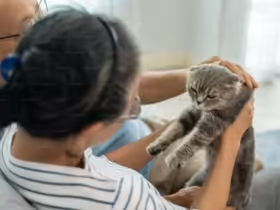Find Out Why Your Kitten Is Sneezing and What You Can Do
Sneezing is a common and often harmless occurrence in kittens, but persistent or severe sneezing can be a sign of underlying issues. Understanding the reasons behind your kitten’s sneezing and knowing how to address the problem effectively can help ensure your feline friend stays healthy and comfortable. This comprehensive guide will explore the common causes of sneezing in kittens and offer practical solutions to manage and alleviate the issue.
Understanding Sneezing in Kittens
Sneezing is a natural reflex that helps clear irritants and foreign particles from the nasal passages. While occasional sneezing in kittens is usually normal, frequent or severe sneezing can indicate a health concern. Here’s a detailed look at why your kitten might be sneezing and what you can do about it.
Common Causes of Sneezing in Kittens
1. Upper Respiratory Infections
Viral Infections:
- Feline Herpesvirus (FHV): This virus is a leading cause of upper respiratory infections in kittens. It can cause sneezing, nasal discharge, and conjunctivitis (eye inflammation).
- Feline Calicivirus (FCV): Another common viral cause, FCV can lead to sneezing, mouth ulcers, and nasal congestion.
Bacterial Infections:
- Secondary bacterial infections can develop following a viral infection, worsening symptoms and leading to thicker, colored nasal discharge.
2. Allergies
Environmental Allergies:
- Pollen, Dust, and Mold: These common allergens can trigger allergic reactions in kittens, resulting in sneezing, runny nose, and itchy eyes.
Food Allergies:
- Although less common, some kittens may develop allergies to specific ingredients in their food, causing respiratory symptoms like sneezing.
3. Irritants
Household Chemicals:
- Cleaning Products and Air Fresheners: Exposure to strong odors or chemicals can irritate a kitten’s nasal passages, leading to sneezing.
Smoke:
- Cigarette Smoke or Other Smoke: Smoke exposure can be particularly irritating and may cause respiratory issues in kittens.
4. Foreign Objects
Nasal Obstruction:
- Grass or Small Toys: Small objects can become lodged in a kitten’s nasal passages, causing sneezing as the body tries to expel the foreign material.
5. Dental Issues
Tooth Problems:
- Infected Teeth or Abscesses: Dental issues, especially those involving infected teeth or abscesses, can sometimes cause sneezing due to their proximity to the nasal passages.
6. Congenital Issues
Nasal Abnormalities:
- Congenital Defects: Rarely, kittens can be born with nasal abnormalities that affect their breathing and cause chronic sneezing.
When to Be Concerned
While occasional sneezing is typically not a cause for concern, you should monitor your kitten for additional symptoms or persistent issues. Seek veterinary attention if you notice:
1. Persistent or Severe Sneezing:
- If your kitten is sneezing frequently or if the sneezing is severe and ongoing.
2. Nasal Discharge:
- Thick, colored, or bloody discharge can indicate an infection or other serious condition.
3. Loss of Appetite or Weight Loss:
- A decrease in appetite or noticeable weight loss may signal an underlying health issue.
4. Difficulty Breathing:
- Signs of labored breathing, wheezing, or difficulty breathing require immediate veterinary evaluation.
5. Eye Discharge or Redness:
- Red, swollen eyes or significant eye discharge could be a sign of an upper respiratory infection.
What You Can Do at Home
1. Maintain a Clean Environment
Regular Cleaning:
- Dust and Allergen Control: Keep your kitten’s living area clean to minimize exposure to dust, mold, and other potential allergens. Regularly clean bedding, litter boxes, and surfaces.
Air Purifiers:
- Improve Air Quality: Use air purifiers to help reduce airborne allergens and irritants.
2. Manage Allergies
Identify and Avoid Triggers:
- Monitor for Allergens: Identify potential allergens and try to minimize your kitten’s exposure to them. This may include avoiding strong fragrances or keeping the home free of dust and mold.
Consult Your Vet:
- Allergy Testing and Treatment: If you suspect allergies, your vet can recommend treatments or dietary changes to help manage your kitten’s symptoms.
3. Provide a Comfortable Space
Proper Ventilation:
- Well-Ventilated Area: Ensure your kitten’s sleeping area is well-ventilated but not exposed to drafts.
Humidify the Air:
- Use a Humidifier: Adding moisture to the air can help soothe irritated nasal passages. Keep the humidifier clean to avoid mold growth.
4. Check for Foreign Objects
Examine Your Kitten:
- Nasal Inspection: Gently check your kitten’s nose for any visible foreign objects. If you suspect something is lodged but can’t see it, consult your veterinarian.
5. Monitor for Dental Issues
Inspect the Mouth:
- Check for Dental Problems: Look for signs of dental issues, such as swelling or redness around the teeth.
Regular Vet Check-Ups:
- Preventive Care: Schedule regular veterinary check-ups to detect and address dental problems early.
When to Seek Veterinary Care
If your kitten’s sneezing is persistent, severe, or accompanied by other concerning symptoms, it’s important to seek veterinary care. Your vet may perform diagnostic tests, such as:
1. Physical Examination:
- Assessment: A thorough physical exam will help identify any obvious issues and determine your kitten’s overall health.
2. Diagnostic Tests:
- Nasal Swabs or Cultures: To identify infections or pathogens.
- X-rays or Ultrasound: To check for foreign objects, nasal abnormalities, or dental issues.
- Blood Tests: To assess for underlying health conditions or systemic infections.
3. Treatment Options:
- Antibiotics or Antiviral Medications: For treating bacterial or viral infections.
- Antihistamines or Steroids: To manage severe allergic reactions or inflammation.
- Surgical Intervention: If a foreign object or significant nasal abnormality is present.











Leave a Reply